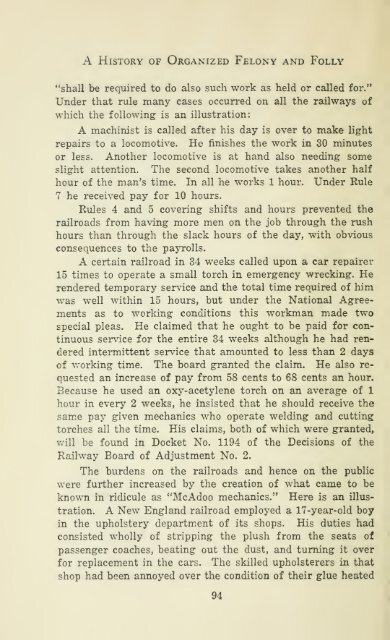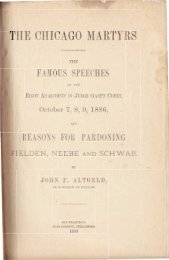A History of Organized Felony and Folly - The Clarence Darrow ...
A History of Organized Felony and Folly - The Clarence Darrow ...
A History of Organized Felony and Folly - The Clarence Darrow ...
Create successful ePaper yourself
Turn your PDF publications into a flip-book with our unique Google optimized e-Paper software.
A <strong>History</strong> <strong>of</strong> <strong>Organized</strong> <strong>Felony</strong> <strong>and</strong> <strong>Folly</strong><br />
"shall be required to do also such work as held or called for."<br />
Under that rule many cases occurred on all the railways <strong>of</strong><br />
which the following is an illustration:<br />
A machinist is called after his day is over to make light<br />
repairs to a locomotive. He finishes the work in 30 minutes<br />
or less. Another locomotive is at h<strong>and</strong> also needing some<br />
slight attention. <strong>The</strong> second locomotive takes another half<br />
hour <strong>of</strong> the man's time. In all he works 1 hour. Under Rule<br />
7 he received pay for 10 hours.<br />
Rules 4 <strong>and</strong> 5 covering shifts <strong>and</strong> hours prevented the<br />
railroads from ha\ing more men on the job through the rush<br />
hours than through the slack hours <strong>of</strong> the day, with obvious<br />
consequences to the payrolls.<br />
A certain railroad in 34 weeks called upon a car repairer<br />
15 times to operate a small torch in emergency wrecking. He<br />
rendered temporary service <strong>and</strong> the total time required <strong>of</strong> him<br />
was well within 15 hours, but under the National Agreements<br />
as to working conditions this workman made two<br />
special pleas. He claimed that he ought to be paid for con-<br />
tinuous service for the entire 34 weeks although he had rendered<br />
intermittent service that amounted to less than 2 days<br />
<strong>of</strong> v/orking time. <strong>The</strong> board granted the claim. He also requested<br />
an increase <strong>of</strong> pay from 58 cents to 68 cents an hour.<br />
Because he used an oxy-acetylene torch on an average <strong>of</strong> 1<br />
hour in every 2 weeks, he insisted that he should receive the<br />
sam.e pay given mechanics who operate welding <strong>and</strong> cutting<br />
torches all the time. His claims, both <strong>of</strong> which were granted,<br />
will be found in Docket No. 1194 <strong>of</strong> the Decisions <strong>of</strong> the<br />
Railway Board <strong>of</strong> Adjustment No. 2.<br />
<strong>The</strong> burdens on the railroads <strong>and</strong> hence on the public<br />
were further increased by the creation <strong>of</strong> what came to be<br />
known in ridicule as "McAdoo mechanics." Here is an illustration.<br />
A New Engl<strong>and</strong> railroad employed a 17-year-old boy<br />
in the upholstery departm.ent <strong>of</strong> its shops. His duties had<br />
consisted wholly <strong>of</strong> stripping the plush from the seats <strong>of</strong><br />
passenger coaches, beating out the dust, <strong>and</strong> turning it over<br />
for replacement in the cars. <strong>The</strong> skilled upholsterers in that<br />
shop had been annoyed over the condition <strong>of</strong> their glue heated<br />
94
















